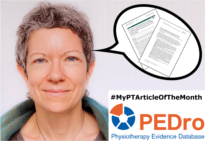
Cornelia A Barth is a physiotherapist with Master of Science qualifications from University College London. She spent the last decade in humanitarian missions in countries in Africa and the Middle East. Cornelia is currently the Physiotherapy Advisor for the International Committee of the Red Cross in Geneva. This position involves supervising physiotherapists in about 150 rehabilitation projects world-wide. These projects are being conducted in the most challenging contexts of low resources and protracted crisis. Cornelia has recently done some reading to inform her work in the prevention of diabetes and cardiovascular disease.
The prevalence of type 2 diabetes mellitus is increasing in low-income and middle-income countries. While community-based programs that address diet, physical activity and health behaviour have been shown to prevent or manage diabetes in high-income countries, effectiveness in lower income countries has not been systematically evaluated. The aim of this systematic review and meta-analysis was to determine if community-based programs can reduce the risk of developing diabetes in at-risk populations in low- and middle-income countries. Six trials published in 2008-2018 were included in the analysis. There was moderate quality evidence that community-based interventions reduced body weight, fasting blood glucose and HbA1C compared to control interventions. The effects on the incidence of diabetes were less clear because the 95% confidence interval for the risk ratio included a harmful effect (1.06) and a very large beneficial effect (0.03). More well-designed and long-term trials are required to improve the precision of this estimate. Cornelia says: “it is encouraging to read that the same simple and low-cost interventions that are effective in high-income countries were also effective in low- and middle-income countries. This is important because medication and patient education interventions are scarce and the prevalence of diabetes is increasing at an alarming rate in low- and middle-income countries. We should promote these evidence-based interventions among the global physiotherapy community as well as at the primary health care level world-wide.”
Cardiovascular disease is also on the rise in low- and middle-income countries. This review aimed to identify the kinds of interventions used to prevent cardiovascular disease in low- and middle-income countries. The second aim was to evaluate the effectiveness of these interventions, but meta-analysis was not performed. The interventions used included education, health promotion, training of health care staff, and implementation of treatment guidelines. Many of the studies reported improvements in weight, physical activity, diet or smoking, but the lack of control groups and the diversity of the settings make generalisation of results difficult. Cornelia says: “this review indicates that a variety of health professionals need to work hand in hand to prevent cardiovascular disease in low- and middle-income countries. But we need better research so that we can design and implement evidence-based programs.”



